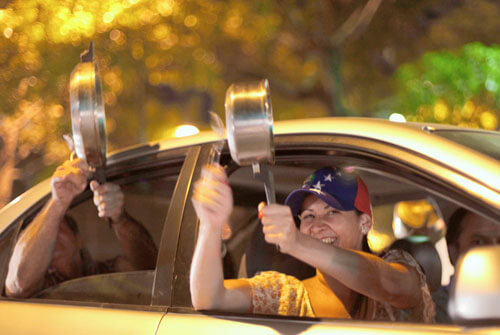CARACAS, Venezuela (AP) — All day, the political heirs of Hugo Chavez filled Venezuela’s airways with a steady drumbeat of attacks on the man who says they stole the presidency from him. They called opposition leader Henrique Capriles a coup-plotter and said he was inciting post-election violence that had claimed seven lives and injured 61.
President-elect Nicolas Maduro further charged Tuesday that the violence was being bankrolled and directed by the United States, which said it wouldn’t recognize his victory without a vote-by-vote recount demanded by Capriles.
It was not clear, however, whether the violence was as serious as Chavez’s anointed successor claimed. Venezuela has an average of more than 40 homicides daily, one of the highest rates in the world, and the government offered almost no information on the deaths that Maduro blamed on “neo-Nazi gangs.”
Capriles called the government assault a smoke screen to divert attention from his demand for a recount of every ballot from Sunday’s election, which the National Electoral Council said Maduro won by 262,000 votes out of 14.9 million cast.
A number of opposition protests across Venezuela have turned violent, but apparently only after National Guard riot troops and police used tear gas and plastic pellets to turn back marchers converging on provincial offices of the electoral council.
While government officials complained of violence by Capriles’ supporters, incidents of intimidation by gangs of pro-government forces, some armed, also occurred.
An Associated Press journalist witnessed a pro-government gang of motorcycle toughs rampage through Teques, seat of the state that Capriles governs. They tossed a firebomb into an opposition party office and smashed display cases and looted goods from a bakery they said was owned by a Capriles supporter.
In the western town of San Francisco in Zulia state, three journalists with the local newspaper La Verdad said they were arrested by motorcycle-borne National Guard troops and jailed overnight Monday because they had interviewed a family that the troops had harassed. Reporter Juan Jose Faria wrote that the troop’s commander told the reporters the country was in the midst of a coup and that they were putschists.
Maduro accused opposition protesters of attacking government health clinics, a socialist party office and the house of electoral council President Tibisay Lucena on Monday, but the government provided no details. Like Chavez, Maduro has a history of making allegations he does not substantiate.
Meanwhile, Maduro’s government announced that 15 countries had confirmed they were sending high-level delegations to Maduro’s swearing-in on Friday. They included Bolivia, Ecuador, Nicaragua, Iran, China, Saudi Arabia, Qatar, Haiti, Uruguay and Argentina.
The potential for violent street confrontations in the capital Wednesday seemed to be headed off when Capriles called off a planned march to electoral council headquarters. That decision came after Maduro urged his supporters to take to Caracas’ streets at the same time.
“Whoever goes out into the street tomorrow is playing the government’s game,” Capriles said at a news conference. “The government wants there to be deaths in the country.”

AP Photo/Ramon Espinosa
























